[Note: This article contains spoilers for “The World’s End.”]
Edgar Wright’s latest film, The World’s End, arrives on a wave of critical praise centered primarily on how the film’s science fiction elements reflect its characters’ struggle with middle age. The protagonist, Gary King (Simon Pegg), drags his childhood friends out for a night of drinking to relive their glory days, only to discover that their hometown is gradually being taken over by strange alien beings. The deeper the film gets into its genre elements, the more pronounced Gary’s troubles become, until the thrills of its robot chases and pub brawls cannot be separated from the wretchedness of Gary’s alcoholism and nostalgic desperation.
The World’s End cements Wright as one of the great directors of contemporary English-language film, one of the few filmmakers to consistently create B-movies that instruct as they entertain, with neither impulse outweighing the other. Wright and Pegg’s fondness for movie quotations has never been used as a crutch, but specific references have been dialed down as if to consciously focus the audience’s attention on the intricacies of the script. The screenplay for The World’s End is a thing of beauty, a paranoid sci-fi chiller played at the breakneck verbal speed of an Ealing comedy. The film’s net effect is to bring the densely connected characteristics of Wright’s filmography to the forefront, so fitting it into the context of his other work requires an exploration of each of those elements, from his stylistic mastery to the variety he brings to consistent themes.
Wright the Action Director
The first thing that stands out about Wright’s films is how well-directed they are. His firm grasp of editing’s potential to bridge time and space, disorient, clarify, and act as a punchline is laid out in the opening scene of Spaced’s broadcast pilot, in which Tim (Pegg) and Daisy (Jessica Hynes) are introduced seemingly in the midst of a shot/reverse shot argument with Tim on the street begging to be taken back as Daisy shoos him away. Suddenly, a cut outward reveals the two to be in different locations, amusingly disrupting what scant information has been given to the audience so far while also stressing a personality link in the pair’s respective dead-end lives.
It’s a minor touch that pays instant dividends, and it prefaces an entire career of in-camera and editing tricks that hide satire and character behind flash. Take the first car “chase” in Hot Fuzz, in which Pegg’s Nicholas Angel and Nick Frost’s Danny Butterman go after a speeding motorist. The camera leaps into the perspective of Danny, weaned on action movies, but it also depicts the dull reality of police work, revving up into a hyper-cut frenzy for barely two seconds before cooling back down as the “perp” instantly complies. The joke is obvious, but the style evokes a mind-meld of Danny’s boyish enthusiasm for amped-up action and Nicholas’ no-nonsense, by-the-book reality, a swift visual foreshadowing of two opposing personalities finding common ground.
Such fleeting perspective shots fill in the gaps of characters in other films, particularly Scott Pilgrim vs. the World, which captures Scott’s mindset by showing how blank his mind can be. Jump cuts over the course of a conversation leap forward in time and space, matching Scott’s tendency to zone out for hours before the last word he half-processed is repeated later and jolts him back into consciousness.
But, of course, Wright stands out most of all for his extended action scenes. With directorial competence in action cinema currently at its lowest ebb at the multiplex, his elaborate setpieces are a breath of fresh air. And it’s no simple matter of long takes vs. short ones, or mounted vs. handheld shots: Wright employs them all. He just uses them in a way so few others still do, as a means to drive the narrative forward. Scott Pilgrim’s fragmented movement informs but does not overpower its setpieces; where so many films these days get lost in faux-visceral incomprehension, Wright’s cuts occur along action and keep a flow going, maintaining a rhythm that makes the small variations in each villain’s fighting style more apparent. Similarly, The World’s End, which leaps into action only after its characters have imbibed a few pints, features brawls shot with swooning long takes that track a thrown punch a half-second too late, a delayed reaction that suggests the camera itself attempted the Golden Mile. Preceding shots that ratchet up the film’s Carpenterian paranoia serve a dual purpose by delineating each pub’s space, never letting any tussle get lost in its movement.
The greatest example of Wright’s ability to efficiently establish geography is Hot Fuzz. Of the many references made to films and filmmakers of the classic action era, the work of John McTiernan is not a prominent citation, yet it’s he who provides the only comparable level of total spatial control. Wright spends almost the entire film mapping his small English town so that, when the climax turns into a Tony Scott-flavored free-for-all, not a single bullet is fired haphazardly, and off-screen space is just as easy to follow as what’s in the frame.
Sandford is a fictional village, but filming was done in Wright’s own hometown, and if all the buildings seen in the film truly exist, then Hot Fuzz makes for the perfect rural counterpart to Die Hard with a Vengeance’s well-ordered New York, a film that could be used to direct people around town the way Ulysses can direct a reader around Dublin. Callback jokes further cement the geography of the town and its large supporting cast, but it is the patient visual planning of Hot Fuzz that best demonstrates how the dense cycles of Wright and Pegg’s dialogue can sublimate into the direction.
A Deceptive Embrace of Man-Children
Wright’s films all abound with references to their own internal tics and those of his other work, and references to outside pop culture frequently dot each script. Spaced in particular revels in geeky obsessions both classic and contemporary, from Star Wars to Buffy the Vampire Slayer, but even The World’s End, with its reduced number of direct quotations, shapes its protagonist by fixating on the early ‘90s. Soundtracks recapture specific cultural trends, shots ape directors like Tarantino and Tony Scott, and dialogue routinely calls attention to various tastes.
Whether it’s Pegg and Jessica Hynes on Spaced or Pegg and Nick Frost in the Cornetto Trilogy or the young adults of Scott Pilgrim vs. the World, the main characters of Wright’s filmography are all defined, in part, by the culture they consume. The camera revels so much in their various musical, cinematic and comic-book loves that it’s easy to think the films celebrate a total immersion into pop culture. Nick Schager argues as much in his recent piece for Vulture, but he overlooks how Wright subverts his own characters, even though they seemingly resemble himself.
Stephen Fry once offered a keen insight into the philosophical difference between American and British comedy, citing the scene in Animal House where Belushi smashes the guitar of an irritatingly pretentious folkie. American comics, Fry argued, would kill for the Belushi part, that of the slob whose greatest effort in life is keeping his life without effort. A British performer, on the other hand, would angle to be the guitarist, the butt of the joke and the debased figure. Wright’s characters are a combination of both, lovable schlubs who seem to be in control until circumstances bring out how pathetic, myopic and stunted they really are.
The aforementioned first scene of Spaced contains the first clue of the deeper intentions of Wright and his writing collaborators. The opening fake-out eventually reveals Tim to be talking to his girlfriend Sarah as she throws him out, with him defending his emotional sensitivity by reminding her how he was strongly affected by the ending of Terminator 2. Pegg imbues Tim with his usual, dorky charm, but that line hangs over nearly all the other episodes in the series; Tim’s ability to relate to real life only through his favorite entertainment remains indicative of his inability to grow up.
Tim (and Daisy, to a lesser extent) is the genesis for all subsequent Wright protagonists. Just as Spaced gradually reveals its characters’ pop cultural reveries to be defense mechanisms rather than harmless pleasures, so to do Wright and Pegg always acknowledge the downside of their obsessions. Even Scott Pilgrim vs. the World, which takes its protagonist’s emotionally-stunted narcissism from Bryan Lee O’Malley’s comic book, is a blatant exploration of the dark side of fandom: Scott’s world is one of arcade game sounds and button-masher spars, but his attention-deficit nature, like Tim and Daisy’s twentysomething solipsism, has left him unaware of just how many people he’s hurt with his selfishness. Danny Butterman is the same, his over-infatuation with action movies providing a vicarious thrill that only further cements his unquestioned comfort in a calm town. Worst of all is Gary King, a living time capsule whose life-stalling obsession with the objects of his youth is painted in broad strokes (he wears the same clothes, drives the same car, and has even kept a cheap mixtape cassette from disintegrating over 23 years of play), his caricatured devotion to outdated fads gradually revealing deeper and deeper levels of psychological trauma and stagnation.
Schager notes that Wright lovingly parodies the films he references, but more revealing is how the director mocks his characters outright for their breathless invocations. Gary stands out as the most obvious example, having disappeared so deeply into the past that old inside jokes from school become indistinguishable from a never-ending affection for the Soup Dragons, his personal identity inextricable from the relics of his teenage tastes. More amusing, but no less insightful, is the sequence in Shaun of the Dead in which the characters first face off against zombies.
In this scene, Shaun finds his only suitable weapon in a box of treasured vinyl, which he and best friend Ed chuck at the undead. But Shaun analyzes each disc before throwing it, only parting with the ones that no longer meet an acceptable level of cool. It’s an absurdist moment that reveals a man who, in that moment at least, would choose death by mastication over getting rid of a prime LP. To look at Shaun or any other major figure in Wright’s oeuvre as a defense of fanboyism is to overlook what a dangerous fool they are in such scenarios.
Time Keeps on Slippin’
The element of nostalgia that pervades these displays of over-identification with mainstream totems informs the strongest element of the director’s character critique. Wright often gets compared to Quentin Tarantino due to his love of obscure trash, razor-sharp dialogue and high low-art direction. But if Wright has ever truly resembled that filmmaker, it’s the Tarantino of Jackie Brown. As in Jackie Brown, the prevailing enemy of Wright’s filmography is time, manifested primarily as a noxious cloud of nostalgia that sets over Britain like an industrial smog.
The daunting prospect of reaching middle age with an unfulfilled life infuses The World’s End with a palpable desperation, to the point that Gary’s own need to return to a sense of belonging infects his far more mature old friends: Eddie Marsan’s Peter runs into his childhood bully, and Paddy Considine’s Steven finds his old feelings for a mate’s sister undiluted. The sci-fi plot around them of people being replaced by robots not only fuels the dramatic movement but reflects a hard truth: that Newton Haven has changed, and the people they thought would remember their antics have forgotten all about them. When the mysterious powers that be see the trouble Gary and his friends are causing, they directly attack the gang with their memories, tempting them with a subtle reversion to 1990.
But The World’s End only makes plain what has been thinly-veiled in all of Wright’s work. On a structural level, all three films of the Cornetto trilogy stylistically hark back to movies from the ‘70s and ‘80s, so rooted in those trappings that it’s easy to forget they’re set in the present day. In Scott Pilgrim, the most youth-oriented of his filmography, Wright ports over O’Malley’s retro aesthetic, basing the film’s look on the likes of Pac-Man, Mario and, music-wise, late-’90s post-grunge and electronica. Scott’s would-be paramour, the teenage Knives Chau, despairs that she cannot compete with Scott’s crush because she “didn’t even know there was good music until like two months ago,” but Scott himself appears confused by the Internet as a basic concept. In some ways, Scott takes nostalgia further than Gary, his entire perspective shaped by a fondness for things of which he has no strong personal memory. Hell, he’s so retro he actually pays for his music!
Only Spaced has any strong connection to contemporary pop culture, but the sense of its characters being outdated infuses nearly every frame. Spaced sets a precedent for most of Wright’s subsequent work, establishing a generational conflict that doesn’t aim up at an older, misunderstanding generation but rather looks internally or even toward the youth coming to supplant the main characters. Tim and Daisy sit on an awkward precipice, their desire to enjoy the liberation of youth giving way to the realization that life will not wait for them to figure out what they want from it. Much of the resentment in Wright’s work simmers between slackers and their more successful peers, and the driven nature of Millennial youth makes them more of a threat than pensioners.
Even Hot Fuzz attacks the stagnating effect of nostalgia. Consider that the villains of this movie are the heroes of Wright’s other work. The Neighborhood Watch Alliance, in their own way, are no different than the young geeks of other films, clinging to life as they understood it well after the world moved on. Yes, they resort to violence to maintain that order, but if other Wright characters could take control of an entire town with the help of like-minded pals and run it in their image, would they not do everything to keep things preserved in a kind of living, social time capsule? Would Tim not behave like Bill Bailey’s comic shop owner and sock any youth who mouthed off about a beloved title? Would Gary King stand for a younger generation deriding Sisters of Mercy? Tellingly, in the climax of The World’s End, the past self with which an alien overseer tempts Gary looks about as quaint in the subterranean lair as Sandford’s idyllic removal from the present day; though one precedes the other, Hot Fuzz offers the most scathing portrait of what happens when nostalgia wins out over progress and one violently maintains the world as they remember it.
Moving Forward
If this all sounds too cynical, it should be noted that Wright’s films are among the most optimistic showing in multiplexes today. Never content to simply wallow in his characters’ torpor, Wright constantly pushes them toward epiphanies and self-actualization. This is typically inspired by a fantastic, dangerous situation, but Wright strikes a key balance in incorporating generic facets into his character arcs. Instead of making his characters react to scenarios, he makes them active in their belated acceptance of responsibility, entwining the horror, action and science-fiction narratives with their thematic undercurrents until they cannot be separated.
This is evident in the surprisingly straight-faced drama Wright inserts into his farces. One character only connects with a stepfather minutes before the man turns into a necrotic cannibal, while another must confront the rot within his living dad’s soul. Deadbeat slackers who might otherwise be seen as endearing, chummy fellows are revealed to wreak emotional havoc on the friends and women they take for granted, creating destructive, codependent relationships that trap even the more mature members of a group in deadly situations they would otherwise avoid. But these stylized dramatic points could, when stripped of zombies or Street Fighter-esque brawls, be normal elements of dramatic fiction on their own, father-son tensions and relationships that present meaningful conflict without the threat of physical death.
Furthermore, Wright even plays his genre exercises against themselves, not merely parodying tropes but pushing them into more complex places. Take the manner in which Scott Pilgrim gains energy swords when he has an emotional breakthrough. Most writers would be content to stop with Scott receiving a sword when he mans up and confesses his love for Ramona. O’Malley and Wright, however, go one step further, shattering that sword and providing a stronger one only when Scott stops externalizing his desires and declares his intention to fight for himself. That detail may not come from Wright’s brain, but it neatly summarizes his entire filmography, a moment that unites narrative with character insights and motivations that take a step beyond the reductive goals erected by supposedly clever genre films. For Wright, it’s not enough for the guy to win the girl; he must first prove capable of making the relationship last once everything settles back to normal and the real work begins.
Wright even finds a role model in the form of Jessica Hynes’ Daisy. Hynes’ portrayal (and, no doubt, her writing) neatly sidesteps the typical pitfalls reserved for women characters written by men. Surrounded by freaks and geeks, Daisy isn’t “just one of the guys,” structured as “gender-blind” so as not to disrupt the men’s lives, but nor is she a hectoring, morally superior shrew. She instead exists as a rarity both in Wright’s hyperbolic filmography and mainstream filmmaking at large: an actual human woman with half-understood life goals and a multifaceted personality. But it is she among the other characters in her age range who first chafes against the bonds of the gang’s slacker anomie and dead-end nerdiness, never losing her goofy sense of play but clearly reaching a point where she wants to move on to the next thing before Tim does. She indirectly succeeds in Shaun of the Dead, in which Hynes appears as a different character leading a gaggle of survivors amusingly similar to Shaun’s crew. Everyone matches up, except for Shaun and Hynes’ Yvonne. Whereas Shaun’s shambolic, seat-of-his-pants “planning” threatens his group as much as it keeps them safe, Yvonne looks almost at home as a leader. If viewed as a spiritual successor to Daisy, Yvonne shows just how far the Spaced character might go if the burdensome restrictions and criteria that deferred her career aims were no longer a factor.
Schager’s article accurately pinpoints that “Wright’s heroes don’t really grow up, or abandon those past things they so love; on the contrary…they retain their essential man-child nature.” That observation is spot-on, but it gives the impression that Wright maintains the status quo, a notion somewhat undermined by the fact that two of the director’s four feature films end post-apocalypse. What Wright’s films suggest more concretely is that one can grow up without putting away childish things, as it were. The World’s End’s seeming endorsement of its protagonist’s alcoholic stubbornness illustrates Wright’s view his character’s fanboyishness: Total abstinence is not the only path to sobriety, and people can fundamentally change while holding onto the things that previously enabled their worst impulses. This refusal to see things in black-and-white without also slipping into murky moral relativism is as much a reason for Wright’s greatness as his razor-sharp scripts and direction, and it makes him an indispensable, singular voice in the modern cinematic landscape. Given how much The World’s End expands on Wright’s work while playing by the parameters of the Cornetto Trilogy, it’s thrilling to guess at where he’ll go next.

















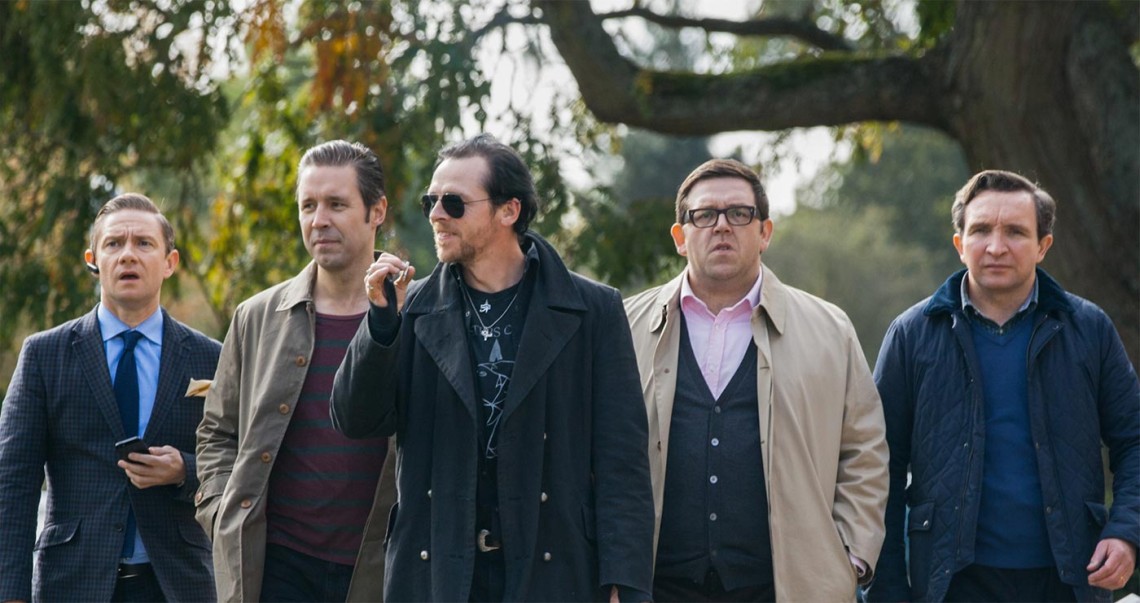
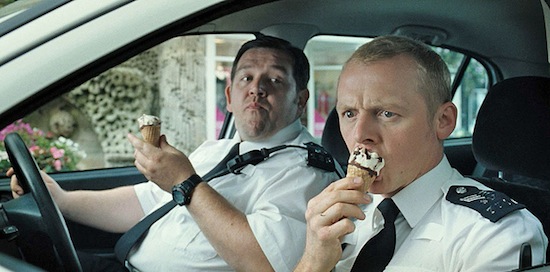
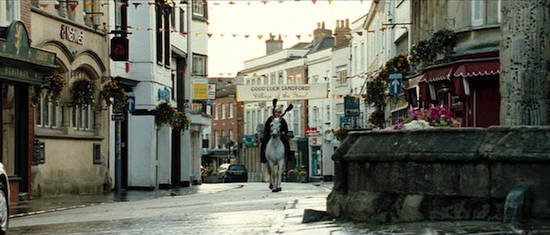

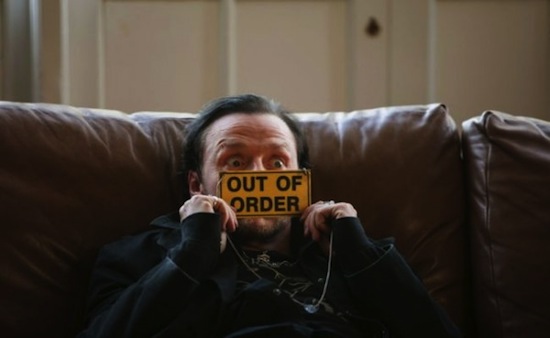
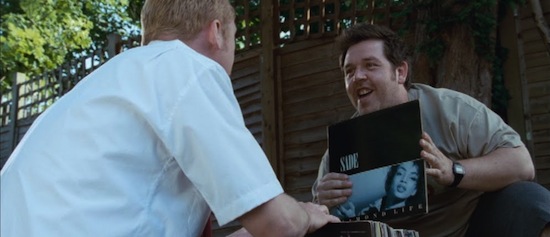
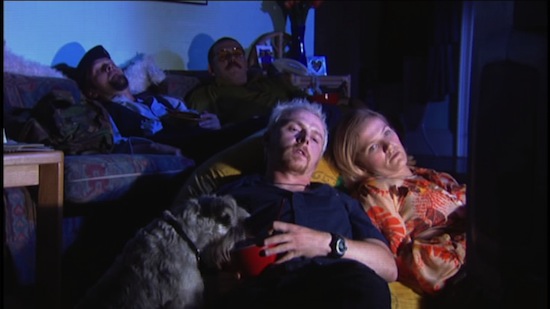

One thought on “Fanboy Versus Fanboy: The Genius of Edgar Wright”
It’s great to see Edgar Wright getting the attention he deserves. I think while Wright’s scripts should be praised, I’m more fascinated by how his direction serves to make the film funnier. I know he’s obviously not the first great comedic director, but his films are so intrinsically tied to his direction. It’s so rare to find a film’s comedic hit points not tied to the writing or acting. I feel if Wright just wrote a script and didn’t direct, so much of the films essence (and laughs) would be lost.